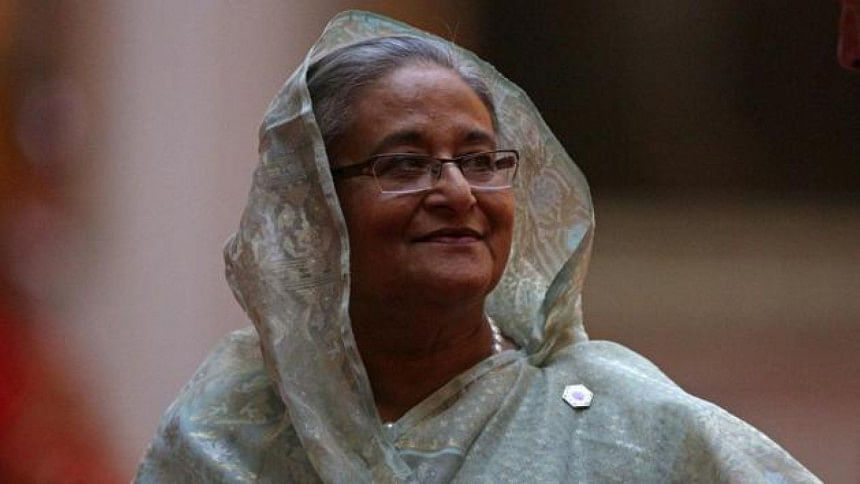PM Hasina’s letters to Mamata, Sarma: Beyond niceties

Seldom does an assembly or Lok Sabha election in any Indian state arouse as much interest among the people across the country's border as in Bangladesh. The results of the recent assembly polls in West Bengal and Assam were keenly watched in India's eastern neighbour. The interest in West Bengal was, understandably, much greater given the powerful linguistic and cultural connections between the state and Bangladesh.
Therefore, it was natural and not-so-unusual on the parts of Bangladesh Prime Minister Sheikh Hasina and Foreign Minister AK Abdul Momen to send separate letters to newly elected Chief Ministers Mamata Banerjee and Himanta Biswa Sarma congratulating them on the victory of Trinamool Congress in West Bengal and Bharatiya Janata Party (BJP) in Assam and in assembly elections in their states, respectively, and taking the reins of power there.
However, to view the letters of Hasina and Momen as mere courtesies would be an incomplete view of the development. A closer look at the letters would reveal that there is subtle and significant political messaging in Hasina's letter to Sarma and Momen's letter to Mamata. Trinamool Congress and BJP are key ideological and political rivals in West Bengal, and the saffron party's main challenger in Assam is Congress. If Mamata singlehandedly worked to stop BJP's charge at Bengal, Sarma was the strategist behind BJP's win in Assam, staving off a spirited fightback by Congress by carefully navigating the minefield of the contentious Citizenship Amendment Act (CAA) issue and successfully putting the National Register of Citizens (NRC) as the panacea for one of Assam's main issues -- illegal migrants.
In her letter to Mamata, PM Hasina said, "The huge victory of the Trinamool Congress in the assembly elections of 2021 is a reflection of deep-rooted trust of the West Bengal people in you."
Momen, in his letter to Mamata, said Bangladesh is thankful to her for "spiritedly upholding the long-cherished values of Bengal -- the principle of religious harmony and brotherhood that Bangabandhu spearheaded throughout his life." Momen also expressed the hope that some of the "outstanding issues" between the two countries would be resolved, a clear allusion to the long-pending Teesta River water-sharing deal which Mamata has been opposing for the last decade. But the reference to the Teesta agreement is more of a routine exercise. What is important to note is Momen's mentioning the "cherished values" of religious harmony and brotherhood and his invoking Bangabandhu Sheikh Mujibur Rahman -- a highly revered personality on both sides of the border --for this.
Despite the perception about BJP in Bangladesh, the Hasina government has gone all the way to engage with the Narendra Modi dispensation in the last ten years in order to take India-Bangladesh relations to a new height, particularly in the field of connectivity, meeting New Delhi's major concerns. But Hasina's letter to Sarma and Momen's letter to Mamata clearly spell out the political preferences of Dhaka. Dhaka is signalling to Delhi that its political preferences should be taken care of by the Modi government.
There have been serious concerns in Dhaka about CAA and NRC which are part of BJP's core ideological agenda now. More than NRC, it is the CAA that aims to give Indian citizenship to people belonging to religious minorities in Bangladesh, Pakistan and Afghanistan who came to India till 2014, and it provoked angry reactions among people in Bangladesh and this has been conveyed to Delhi a number of times in the last four years. It should be kept in mind that the political component of relations between the two countries only facilitates progress in other areas. The political rhetoric in using descriptions like "termites" for "illegal migrants" in India creates bad blood in bilateral ties and is far from helpful.
Of course, Hasina's letters to both Mamata and Sarma go much beyond political nuances. She has talked about shared economic development and connectivity as Bengal and Assam are among the five Indian states that share border with Bangladesh. There is little doubt that Bangladesh is central to India's efforts to improve connectivity with its north-eastern region.
In the letter to the Assam chief minister, Hasina has made out a strong case for the state -- as also India's northeast --plugging into Bangladesh's economic growth and graduating into a middle-income country and inviting Assam to "reap the benefits from our socio-economic development and growth trajectory".
The government of Bangladesh "remains steadfast in strengthening connectivity for the north-eastern part of India," Hasina said, pointing to her country's geographical advantage as a connectivity hub between South and Southeast Asia and how Dhaka is supportive of Delhi's Act East policy. The fact that India and Bangladesh have revived five out of the pre-1965 rail links, and that Bangladesh has expressed keenness to join the India-Myanmar-Thailand trilateral highway connecting South Asia with Southeast Asia, once again demonstrate how the two neighbouring countries can benefit from a greater economic integration and closer physical connectivity.
Given the high economic stakes involved in enhanced Bangladesh-India ties, is it too much to visualise a greater political alignment between the governments of the two countries despite the differences in their ideologies? A political dialogue between them will be very much in order.
Pallab Bhattacharya is a special correspondent of The Daily Star. He writes from New Delhi, India.

 For all latest news, follow The Daily Star's Google News channel.
For all latest news, follow The Daily Star's Google News channel. 



Comments